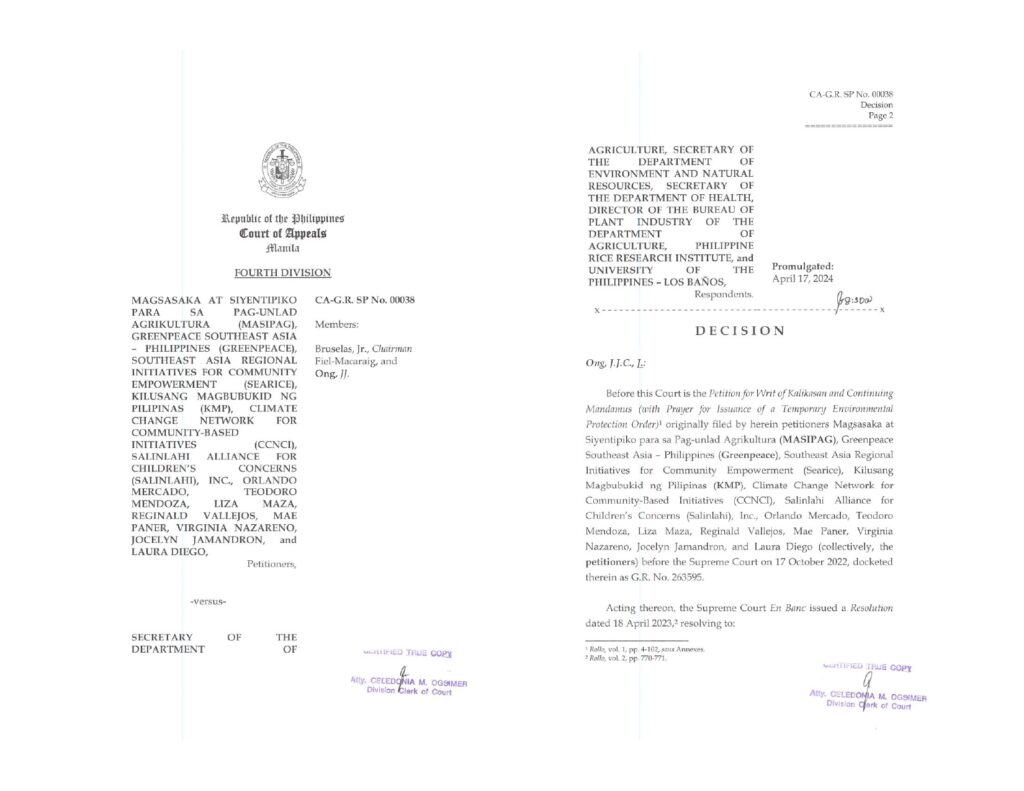The Court of Appeals, Fourth Division (CA) issued a cease and desist order on the commercial propagation of Bt Eggplant and Golden Rice by the University of the Philippines Los Banos (UPLB) and the Philippine Rice Research Institute (PRRI), respectively. The decision also directed the Department of Agriculture (DA), Department of Environment and Natural Resources (DENR), Department of Health (DoH) and the Bureau of Plant Industry (BPI) to strengthen risk assessment procedures and promulgate mechanisms for the monitoring of all activities conducted under the rules governing applications involving genetically modified organisms (GMOs). Likewise, any and all applications for contained use, field testing, direct use as food or feed, or processing, commercial propagation, and importation of GMOs are enjoined until the government has addressed and strengthened the risk assessment and monitoring procedures mandated in accordance with the decision.
In its 143-page Decision dated April 17, 2024, the CA ruled in favor of the petitioners led by Magsasaka At Siyentipiko para sa Pag-Unlad Agrikultura (Masipag) and Greenpeace Southeast Asia (Greenpeace). The Court granted the privilege of the Writ of Kalikasan, which directed both respondents UPLB and PRRI to desist from commercially propagating and conducting activities relating to Bt Eggplant and Golden Rice, respectively. The CA also granted the Writ of Continuing Mandamus, which ordered the concerned respondents government agencies to submit to the CA strengthened risk assessment procedures and concrete mechanisms to monitor all activities conducted under the Joint Department Circular (JDC) Nos. 1-2016 and 1-2021.
Upholding the right to a balanced and healthful ecology and the right to health, the CA applied the precautionary principle recognized under the Rules of Procedure on Environmental Cases owing to the lack of “full scientific certainty” on the effects—good or bad—of genetically-modified organism (GMO) products, Bt Eggplant and Golden Rice. In the face of such uncertainty, the precautionary principle calls for actions to be taken to avoid or diminish the “threats of serious and irreversible damage to the environment.”
The CA noted that “[t]he opinions of the expert witnesses for all parties,…, the numerous studies they submitted in evidence, and their testimonies during the hot-tubbing , suggest that no consensus could be reached on the safety or harmful effects of Golden Rice and Bt Eggplant on humans and the environment.” The court stressed that “the burden of evidence of harm is placed on those desiring to change the status quo, who…are the respondents.”
The CA also found that “[t]he BPI and the [other] concerned government agencies have unlawfully neglected to perform their duty of conducting monitoring activities, which…is essential to risk assessment.” The court found that “the approach of the government is merely to wait or receive information from the proponents or the public, or to be reactive rather than to effectively initiate monitoring activities, or to be proactive.”
Highlighted further by the CA were the following insufficiencies of the JDC provisions: 1) the monitoring provision in JDC No. 1-2021 is too broad; 2) the JDC No. 1-2021 failed to include a provision on labeling the GMOs so as to distinguish the same from non-GMO products; and, 3) the concerned government agency should adopt more realistic time frame for processing biosafety permit (BSP) applications.
Until the deficiencies noted in the decision are addressed by the concerned government agencies, any application for contained use, field testing, direct use as food or feed, or processing, commercial propagation, and importation of all GMOs are enjoined. Masipag and Greenpeace were represented by lawyers from the Community Legal Help and Public Interest Center and the Center for International Law (Phils.), Inc. (Roger Rayel)

